S
Sarah Perez
Guest
Welcome back to This Week in Apps, the weekly TechCrunch series that recaps the latest in mobile OS news, mobile applications and the overall app economy.
The app industry continues to grow, with a record number of downloads and consumer spending across both the iOS and Google Play stores combined in 2021, according to the latest year-end reports out this week. App Annie says global spending across iOS and Google Play is up to $135 billion in 2021, and that figure will likely be higher when its annual report, including third-party app stores in China, is released next year. Consumers also downloaded 10 billion more apps this year than in 2020, reaching nearly 140 billion in new installs, it found.
Apps aren’t just a way to pass idle hours — they’re also a big business. In 2019, mobile-first companies had a combined $544 billion valuation, 6.5x higher than those without a mobile focus. In 2020, investors poured $73 billion in capital into mobile companies — a figure that was up 27% year-over-year.
This Week in Apps offers a way to keep up with this fast-moving industry in one place with the latest from the world of apps, including news, updates, startup fundings, mergers and acquisitions, and suggestions about new apps and games to try, too.
Do you want This Week in Apps in your inbox every Saturday? Sign up here: techcrunch.com/newsletters
This week, both Sensor Tower and App Annie released their year-end estimates on the app economy in 2021. Sensor Tower is forecasting that, by the end of the year, Apple’s App Store and Google Play will see a combined record consumer spend of $133 billion and 143.6 billion downloads. Its report came out first and we covered it here on TechCrunch. Today, we’ve got App Annie’s report in our hands, too.
App Annie’s estimates come in slightly higher than Sensor Tower’s on consumer spend, but lower on downloads. App Annie says global consumers will spend a record $135 billion across the App Store and Google Play in 2021, up from $112 billion in 2020. However, it reports 140 billion new app installs, instead of 143.6 billion.
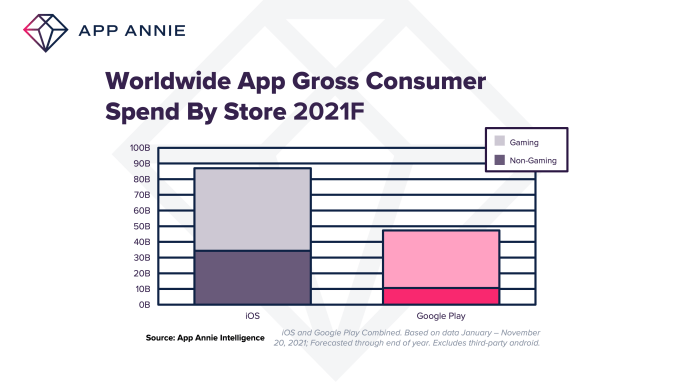
Image Credits: App Annie
The firm also found iOS spending continues to top Android spending. It notes that 65 cents in every app economy dollar is now spent by Apple users. And gamers spend the most. They will have contributed around 60% of the iOS revenue and nearly 80% of Google Play revenue in 2021. In total, gaming contributed around $90 billion of the total global spend in 2021.
App Annie also saw many of the same trends as Sensor Tower did, including the revenue growth in non-gaming categories, particularly entertainment and social apps — the former which is rising to $12 billion next year, or double that of 2020.
In terms of app downloads, India was the top market, contributing 20% of global downloads across both stores, followed by the U.S. (9%), then Brazil (8%).
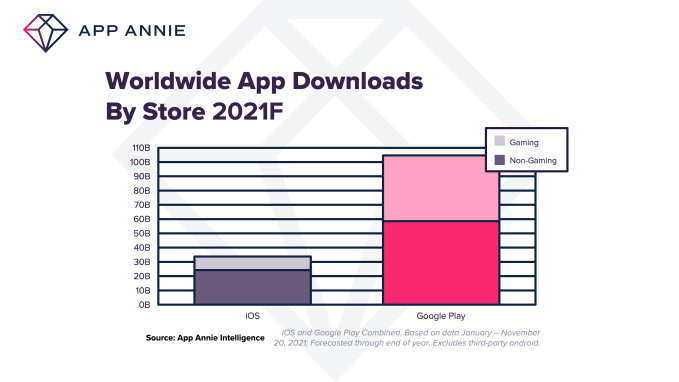
Image Credits: App Annie
App Annie selected TikTok as a top “breakout” app for consumer spending the year. (It’s No. 2 on App Annie’s “breakout” chart that ranks the apps that saw the biggest change in the past 12 months.) But TikTok is also influencing other apps. For example, a video editing app called CapCut — a popular TikTok editing tool — was the No. 1 breakout app by downloads.
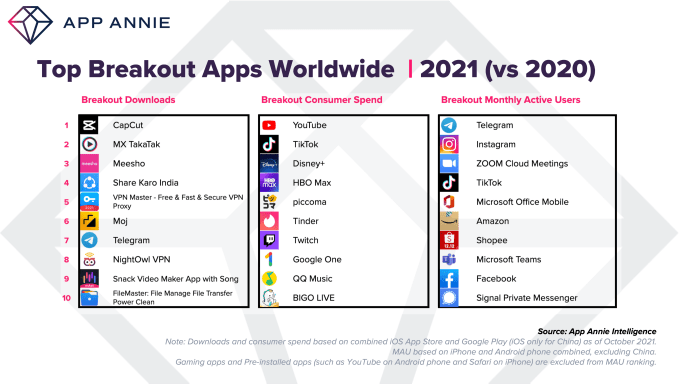
Image Credits: App Annie
App Annie’s report focuses more on “breakout” apps and games rather than the traditional top apps by downloads and consumer spending. It’s an interesting way to view the data as it points to more newcomers and fast risers, but it doesn’t tell you which were the “biggest” apps of the year, necessarily. The full report is here.
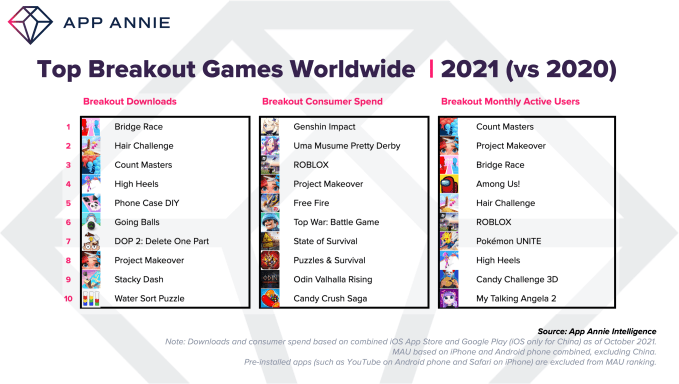
Image Credits: App Annie
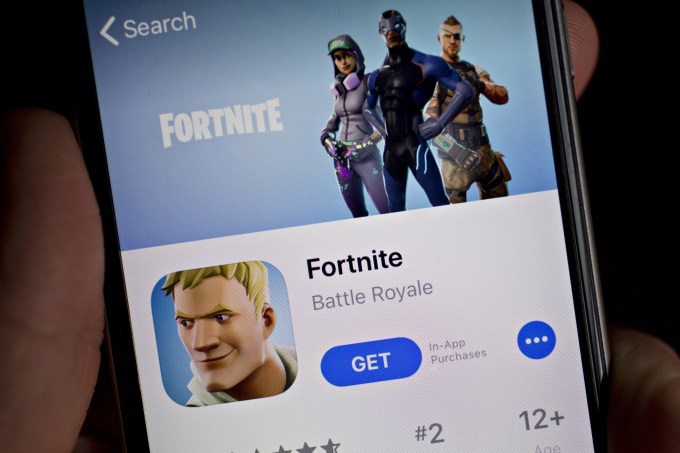
Image Credits: Andrew Harrer/Bloomberg / Getty Images
Apple will not have to implement changes to its in-app purchase system and App Store guidelines as ordered by the judge’s ruling in its court battle with Epic Games. Apple largely won that case, as the court ruled Apple was not acting as a monopolist. But the company had been ordered to stop preventing app developers from adding links that pointed users to other means of paying for their in-app purchases outside the App Store. Both Apple and Epic appealed the original ruling — Epic because it was not successful with its larger antitrust claims, and Apple because it disagreed with this aspect of the ruling over in-app purchases.
Apple originally had until December 9 to update its App Store policies, but had asked the court for a stay on the injunction regarding the changes to its in-app purchasing guidelines until the appeal was decided. Apple had tried to argue its case for a stay before but the lower court denied the motion. Its latest attempt, however, was granted by the U.S. Court of Appels for the Ninth Circuit after Apple argued, among other things, that it would have to come up with a whole new system to commission purchases that took place outside the App Store. Yep, that’s right — Apple doesn’t think that allowing app developers to point to their own websites for payments means it can’t still take a cut. (After all, isn’t that what Google decided to do in South Korea?)
In any event, Apple successfully argued this would cause “irreparable harm” as Apple wouldn’t get back the money, time and resources it spent on this new system if the appeal came through in its favor. As a result, Apple won’t have to make any changes until the appeals court has heard the case.
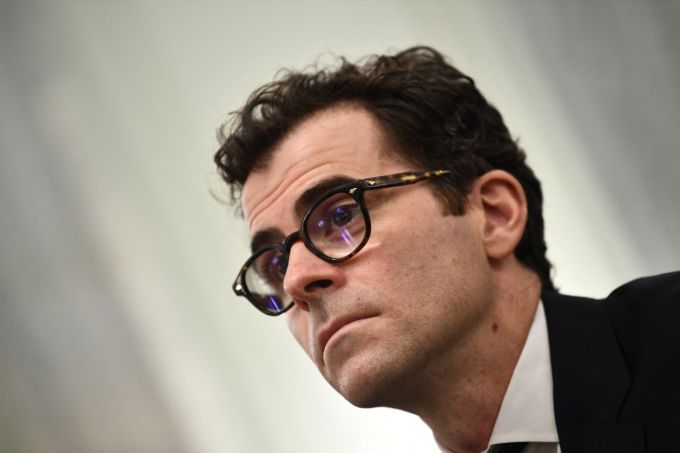
(Photo by BRENDAN SMIALOWSKI/AFP via Getty Images)
Instagram head Adam Mosseri testified before Congress for the first time Wednesday to defend the app’s teen safety track record. Senators were not impressed with the 3 AM release of promised teen safety features the night before the testimony as some sort of last-minute effort to look like the company had plans to fix its systems. There was a sense of frustration in asking Mosseri many of the same questions that had been asked to other Meta execs over the past couple of years, Sen. Blackburn (R-TN) noted, saying “I feel like the conversation repeats itself ad nauseam. Nothing changes — nothing.”
Mosseri denied that research showed Instagram’s products were addictive and said the company had put into place protections and age-approrpriate experiences for minor ages 13-17 on the app. But Blackburn’s office had discovered teens’ accounts still defaulted to public rather than private when created...
The app industry continues to grow, with a record number of downloads and consumer spending across both the iOS and Google Play stores combined in 2021, according to the latest year-end reports out this week. App Annie says global spending across iOS and Google Play is up to $135 billion in 2021, and that figure will likely be higher when its annual report, including third-party app stores in China, is released next year. Consumers also downloaded 10 billion more apps this year than in 2020, reaching nearly 140 billion in new installs, it found.
Apps aren’t just a way to pass idle hours — they’re also a big business. In 2019, mobile-first companies had a combined $544 billion valuation, 6.5x higher than those without a mobile focus. In 2020, investors poured $73 billion in capital into mobile companies — a figure that was up 27% year-over-year.
This Week in Apps offers a way to keep up with this fast-moving industry in one place with the latest from the world of apps, including news, updates, startup fundings, mergers and acquisitions, and suggestions about new apps and games to try, too.
Do you want This Week in Apps in your inbox every Saturday? Sign up here: techcrunch.com/newsletters
Top Stories
App economy in 2021 reaches $133-135 billion
This week, both Sensor Tower and App Annie released their year-end estimates on the app economy in 2021. Sensor Tower is forecasting that, by the end of the year, Apple’s App Store and Google Play will see a combined record consumer spend of $133 billion and 143.6 billion downloads. Its report came out first and we covered it here on TechCrunch. Today, we’ve got App Annie’s report in our hands, too.
App Annie’s estimates come in slightly higher than Sensor Tower’s on consumer spend, but lower on downloads. App Annie says global consumers will spend a record $135 billion across the App Store and Google Play in 2021, up from $112 billion in 2020. However, it reports 140 billion new app installs, instead of 143.6 billion.

Image Credits: App Annie
The firm also found iOS spending continues to top Android spending. It notes that 65 cents in every app economy dollar is now spent by Apple users. And gamers spend the most. They will have contributed around 60% of the iOS revenue and nearly 80% of Google Play revenue in 2021. In total, gaming contributed around $90 billion of the total global spend in 2021.
App Annie also saw many of the same trends as Sensor Tower did, including the revenue growth in non-gaming categories, particularly entertainment and social apps — the former which is rising to $12 billion next year, or double that of 2020.
In terms of app downloads, India was the top market, contributing 20% of global downloads across both stores, followed by the U.S. (9%), then Brazil (8%).

Image Credits: App Annie
App Annie selected TikTok as a top “breakout” app for consumer spending the year. (It’s No. 2 on App Annie’s “breakout” chart that ranks the apps that saw the biggest change in the past 12 months.) But TikTok is also influencing other apps. For example, a video editing app called CapCut — a popular TikTok editing tool — was the No. 1 breakout app by downloads.

Image Credits: App Annie
App Annie’s report focuses more on “breakout” apps and games rather than the traditional top apps by downloads and consumer spending. It’s an interesting way to view the data as it points to more newcomers and fast risers, but it doesn’t tell you which were the “biggest” apps of the year, necessarily. The full report is here.

Image Credits: App Annie
Apple doesn’t have to change its App Store yet, court rules

Image Credits: Andrew Harrer/Bloomberg / Getty Images
Apple will not have to implement changes to its in-app purchase system and App Store guidelines as ordered by the judge’s ruling in its court battle with Epic Games. Apple largely won that case, as the court ruled Apple was not acting as a monopolist. But the company had been ordered to stop preventing app developers from adding links that pointed users to other means of paying for their in-app purchases outside the App Store. Both Apple and Epic appealed the original ruling — Epic because it was not successful with its larger antitrust claims, and Apple because it disagreed with this aspect of the ruling over in-app purchases.
Apple originally had until December 9 to update its App Store policies, but had asked the court for a stay on the injunction regarding the changes to its in-app purchasing guidelines until the appeal was decided. Apple had tried to argue its case for a stay before but the lower court denied the motion. Its latest attempt, however, was granted by the U.S. Court of Appels for the Ninth Circuit after Apple argued, among other things, that it would have to come up with a whole new system to commission purchases that took place outside the App Store. Yep, that’s right — Apple doesn’t think that allowing app developers to point to their own websites for payments means it can’t still take a cut. (After all, isn’t that what Google decided to do in South Korea?)
In any event, Apple successfully argued this would cause “irreparable harm” as Apple wouldn’t get back the money, time and resources it spent on this new system if the appeal came through in its favor. As a result, Apple won’t have to make any changes until the appeals court has heard the case.
Instagram goes to Congress

(Photo by BRENDAN SMIALOWSKI/AFP via Getty Images)
Instagram head Adam Mosseri testified before Congress for the first time Wednesday to defend the app’s teen safety track record. Senators were not impressed with the 3 AM release of promised teen safety features the night before the testimony as some sort of last-minute effort to look like the company had plans to fix its systems. There was a sense of frustration in asking Mosseri many of the same questions that had been asked to other Meta execs over the past couple of years, Sen. Blackburn (R-TN) noted, saying “I feel like the conversation repeats itself ad nauseam. Nothing changes — nothing.”
Mosseri denied that research showed Instagram’s products were addictive and said the company had put into place protections and age-approrpriate experiences for minor ages 13-17 on the app. But Blackburn’s office had discovered teens’ accounts still defaulted to public rather than private when created...
Please login to view full content. Log in or register now.
